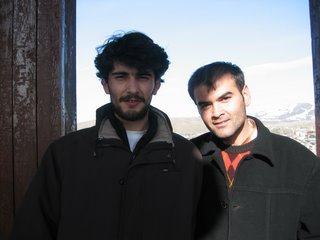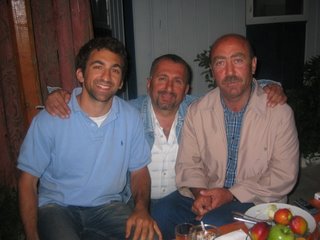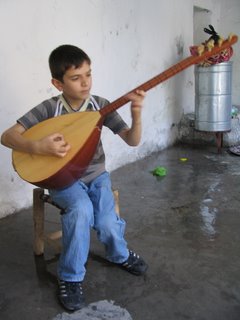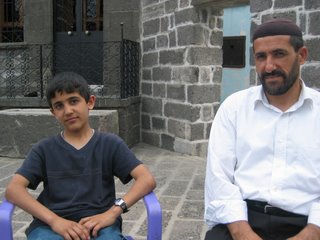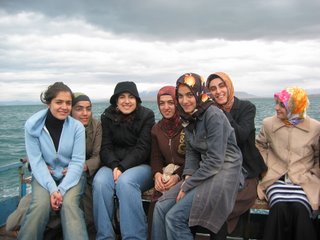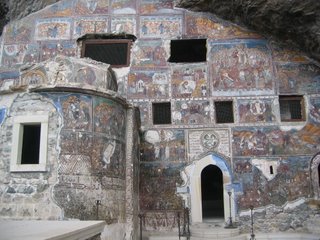Youth are Key to Turkey's Future
Much has happened in Turkey in the nine months since I began writing this blog. In my first post, I mentioned “different forces” that are shaping Turkey’s future. These forces have continued their work, making Turkey weave a zigzag course towards an unknown future. These developments include
• the supposed military-organized bombing of a Kurdish bookstore in Şemdeli
• the PKK’s own bombings in İstanbul and elsewhere
• the first joint conference about the “Armenian issue” held at a private university in İstanbul to the chagrin of the Minister of Justice Cemil Çiçek
• the abandoning of Orhan Pamuk’s trial (in light of major European opposition. Many other journalists are still held, also charged with violating article 301 by publicly denigrating Turkish identity)
• the assassination of a prominent judge by an Islamic fundamentalist angered over the court’s ruling forbidding schoolteachers from wearing the headscarf not only in school, but also on the way to school
• the attacks on Catholic priests in Trabzon, Izmir, and Samsun
• the Turkish government’s reception of a Hamas delegation in February; and
• the many steps and setbacks on the road to EU accession
It is clear that Turkey has a range of powers, both internal and external, that are eager to usher Turkey toward their own vision of the future, be it Western, Islamic, strict nationalist Kemalist, or an unlikely combination of those.
While it is difficult to say which power has the upper hand, youth are one group that does have a major influence due to sheer numbers.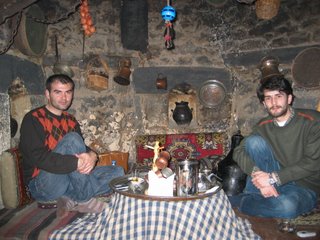
How this populous group reacts to these forces has the potential to change Turkey’s future. While most students are eager to see a Turkey that emphasizes equality of opportunity, especially economic and educational, many students seem content to wait for the government to provide this equality. Given the distaste that most students have for the political process and politicians, this willingness to wait does not bode well for Turkey’s political future. Many students fail to vote regularly, either as a conscious choice or because of the bureaucracy involved in absentee voting.
The majority of students, Kurds excepted, have adopted an ambivalent attitude towards EU accession. While many are eager for the opportunities membership offers and the structural benefits that the process brings, they are skeptical about EU intentions and eager to see reforms generated within Turkey’s own government.
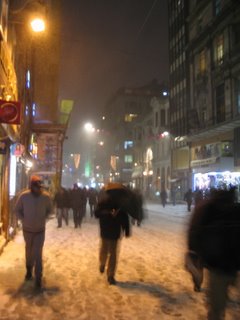 On the whole, however, Turkish students have a strong degree of social consciousness, and if given the opportunity, they may find their voices outside of the political arena. As the strength and reach of civil society grows, I predict that an increasing number of students will find this solution to social woes appealing because of its action and often-apolitical nature. Whatever happens with these students, it is clear that harnessing the energy and power of this large demographic will be a boon to the group that caught them.
On the whole, however, Turkish students have a strong degree of social consciousness, and if given the opportunity, they may find their voices outside of the political arena. As the strength and reach of civil society grows, I predict that an increasing number of students will find this solution to social woes appealing because of its action and often-apolitical nature. Whatever happens with these students, it is clear that harnessing the energy and power of this large demographic will be a boon to the group that caught them.
This will be my last regular post on this blog. I may, from time to time, post links to articles about Turkey, so feel free to keep checking…
• the supposed military-organized bombing of a Kurdish bookstore in Şemdeli
• the PKK’s own bombings in İstanbul and elsewhere
• the first joint conference about the “Armenian issue” held at a private university in İstanbul to the chagrin of the Minister of Justice Cemil Çiçek
• the abandoning of Orhan Pamuk’s trial (in light of major European opposition. Many other journalists are still held, also charged with violating article 301 by publicly denigrating Turkish identity)
• the assassination of a prominent judge by an Islamic fundamentalist angered over the court’s ruling forbidding schoolteachers from wearing the headscarf not only in school, but also on the way to school
• the attacks on Catholic priests in Trabzon, Izmir, and Samsun
• the Turkish government’s reception of a Hamas delegation in February; and
• the many steps and setbacks on the road to EU accession
It is clear that Turkey has a range of powers, both internal and external, that are eager to usher Turkey toward their own vision of the future, be it Western, Islamic, strict nationalist Kemalist, or an unlikely combination of those.
While it is difficult to say which power has the upper hand, youth are one group that does have a major influence due to sheer numbers.

How this populous group reacts to these forces has the potential to change Turkey’s future. While most students are eager to see a Turkey that emphasizes equality of opportunity, especially economic and educational, many students seem content to wait for the government to provide this equality. Given the distaste that most students have for the political process and politicians, this willingness to wait does not bode well for Turkey’s political future. Many students fail to vote regularly, either as a conscious choice or because of the bureaucracy involved in absentee voting.
The majority of students, Kurds excepted, have adopted an ambivalent attitude towards EU accession. While many are eager for the opportunities membership offers and the structural benefits that the process brings, they are skeptical about EU intentions and eager to see reforms generated within Turkey’s own government.
 On the whole, however, Turkish students have a strong degree of social consciousness, and if given the opportunity, they may find their voices outside of the political arena. As the strength and reach of civil society grows, I predict that an increasing number of students will find this solution to social woes appealing because of its action and often-apolitical nature. Whatever happens with these students, it is clear that harnessing the energy and power of this large demographic will be a boon to the group that caught them.
On the whole, however, Turkish students have a strong degree of social consciousness, and if given the opportunity, they may find their voices outside of the political arena. As the strength and reach of civil society grows, I predict that an increasing number of students will find this solution to social woes appealing because of its action and often-apolitical nature. Whatever happens with these students, it is clear that harnessing the energy and power of this large demographic will be a boon to the group that caught them.This will be my last regular post on this blog. I may, from time to time, post links to articles about Turkey, so feel free to keep checking…

